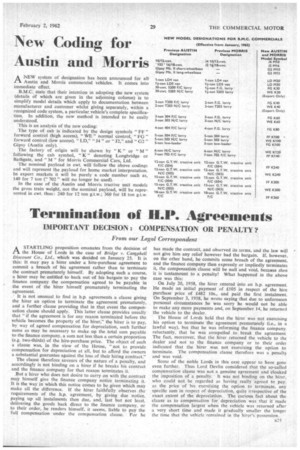Termination of H.P. Agreements
Page 83

If you've noticed an error in this article please click here to report it so we can fix it.
IMPORTANT DECISION: COMPENSATION OR PENALTY?
From our Legal Correspondent
A STARTLING proposition emanates from the decision of IA the House of Lords in the case of Bridge v. Campbell Discount Co., Ltd., which was decided on January 25. It is this: It may pay a hirer under a hire-purchase agreement to commit a breach of his agreement rather than to terminate the contract prematurely himself, By adopting such a course, a hirer may be entitled to back out of his bargain to pay the finance company the compensation agreed to be payable in the event of the hirer himself prematurely terminating the agreement.
It is not unusual to find in h.p. agreements a clause giving the hirer an option to terminate the agreement prematurely, and a further clause providing that in that event the compensation clause should apply. This latter clause provides usually that "if the agreement is for any reason terminated before the vehicle becomes the property of the hirer," the hirer is to pay, by way of agreed compensation for depreciation, such further sums as may be necessary to make up the total sum payable to the finance company, a sum not less than a certain proportion (e.g. two-thirds) of the hire-purchase price. The object of such a clause was, in the view of the House, "not to provide compensation for depreciation at all, but to afford the owners a substantial guarantee against the loss of their hiring contract."
The clause therefore savaurs of the nature of a penalty, and accordingly is not binding on a hirer if he breaks his contract and the finance company for that reason terminates it.
But a hirer who does not desire to carry on with the contract may himself give the finance company notice terminating it. It is the way in which this notice comes to be given which may make all the difference, If the hirer faithfully observes the requirements of the h.p. agreement, by giving due notice, paying up all instalments then due, and, last but not least. delivering the goods back direct to the finance company, or to their order, he renders himself, it seems, liable to pay the full compensation under the compensation clause. For he
has made the contract, and observed its terms, and the law will not give him anyrelief however bad the bargain. If, however, on the other hand, he commits some breach of the agreement, and the finance company then expressly or impliedly terminates it, the compensation clause will be null and void, because then it is tantamount to a penalty! What happened in the above case was this:
• On July 20, 1958, the hirer entered into an h.p. agreement. He made an initial payment of £105 in respect of the hire purchase price of £482 10s., and paid the first instalment. On September 3, 1958, he wrote saying that due to unforeseen personal circumstances he was sorry he would not be able to make any more payments and, on September 14, he returned the vehicle to the dealer.
The House of Lords held that the hirer was not exercising his option to terminate theagreement prematurely (i.e., in a lawful way), but that he was informing the finance company. reluctantly, that he was compelled to break the agreement The fact, moreover, that the hirer returned the vehicle to the dealer and not to the finance company or to their ordei indicated that the hirer was not exercising the option to terminate. The compensation clause therefore was a penalty and was void.
Some of the noble Lords in this case appear to have gone even further. Thus Lord Devlin considered that the so-called compensation clause was not. a genuine agreement and cloaked the imposition of a penalty. It was not binding on the hirer, who could not, be regarded as having .really agreed to pay. as the price of his exercising the option to terminate, any specific sum in respect of depreciation, quite irrespective of the exact extent of the 'depreciation.. The curious fact about the clause as to compensation for depreciation was that it made the compensation largest when the vehicle was returned after a very short time and made it gradually smaller the longer the time that the vehicle remained in the hirer's possession.




























































































































